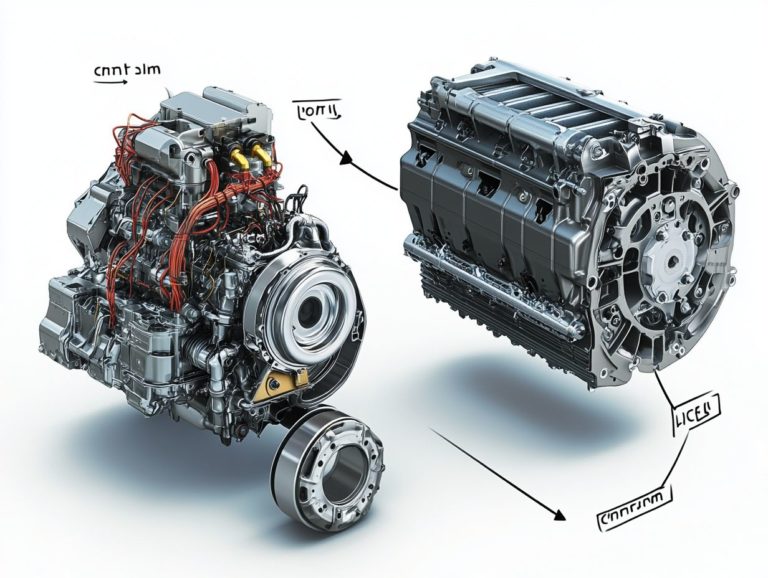How to Assess Reliability in Car Comparisons
When selecting a car, reliability is a crucial factor that shapes your ownership experience. This article explores why reliability matters in car comparisons and looks at elements that affect it, including dependable data sources and accurate comparison metrics.
You’ll discover methods for evaluating reliability, such as expert reviews and consumer surveys. By the time you finish reading, you’ll be empowered to make informed decisions that align perfectly with your needs.
Contents
- Key Takeaways:
- Understanding Reliability in Car Comparisons
- Factors to Consider in Assessing Reliability
- Methods for Evaluating Reliability
- Interpreting Reliability Data
- Frequently Asked Questions
- What is reliability when comparing cars?
- How can I assess the reliability of a car in comparison to others?
- Are there specific factors I should consider when comparing reliability?
- Do certain brands have a reputation for being more reliable?
- Is it better to choose a car with a higher reliability rating, even if it costs more?
- Can I rely solely on reliability ratings when comparing cars?
Key Takeaways:
- Reliability measures how trustworthy information is in car comparisons.
- Accurate information helps you make informed decisions.
- To evaluate reliability, consider data sources, comparison metrics, expert reviews, and consumer reports.
Understanding Reliability in Car Comparisons
Understanding reliability is key when making purchasing decisions. It refers to how likely a car is to run well without breaking down, impacting your satisfaction and the vehicle’s long-term value.
Resources like Consumer Reports and various auto surveys provide essential information on reliability. They guide you through automotive complexities and offer insights into how dependable different car models are.
This information is vital for making the best choice, especially in today’s market of electric vehicles and hybrids, where reliability predictions and historical data play significant roles in your decision-making process.
What is Reliability?
Reliability indicates how well a vehicle operates over time. You can assess this using performance data and historical trends to predict future performance.
This concept is significant for consumers seeking a dependable and trouble-free driving experience. Many prefer car brands with a proven track record for reliability, which influences their perceptions and purchasing choices.
A vehicle’s reliability history serves as a benchmark, informing you of the long-term dependability you can expect. By analyzing automotive research, you can discern which brands genuinely deliver on their promises, enhancing your savvy consumer skills.
Why is Reliability Important in Car Comparisons?
Reliability is vital in car comparisons as it affects dependability, ownership experience, and long-term satisfaction—essential factors for any potential buyer.
When exploring your options, you often rely on reliability ratings from surveys to inform your decisions. Brands like Toyota and Honda often rank high, boosting customer trust and brand loyalty.
These ratings serve as benchmarks, indicating that owners typically face fewer repairs and enjoy higher satisfaction levels. Being aware of these insights helps you make informed choices, leaning toward vehicles known for their durability.
Factors to Consider in Assessing Reliability
When evaluating reliability, consider key factors such as:
- Data collection methods
- Sample size of survey respondents
- Reliability information from surveys and historical data analysis
Each element plays a crucial role in forming a comprehensive understanding of reliability.
Dependability of Data Sources
Reliable data sources are essential for accurate assessments. The credibility of automotive research depends on the accuracy of surveys provided by reputable organizations like Consumer Reports.
These entities validate data, ensuring the information is trustworthy and actionable. By adhering to stringent methodologies, they enhance the reliability of their findings.
Importance of Comparison Metrics
The accuracy of comparison metrics is critical for meaningful assessments. Metrics like the frequency of repairs, severity of issues, and owner satisfaction ratings are vital. Reliable data reflects true trends, not random anomalies.
If a specific model often has transmission issues, it indicates a common problem. Understanding these metrics enables you to make informed decisions and holds manufacturers accountable for reliability concerns.
Methods for Evaluating Reliability
Evaluating reliability involves a mix of expert reviews, Consumer Reports surveys, and reliability score analyses. Together, these methods offer invaluable insights into vehicle dependability.
Expert Reviews and Ratings
Expert reviews help assess a vehicle’s reliability by providing insights into performance and common issues encountered by consumers.
These analyses cover indicators like fuel efficiency, safety features, and maintenance frequency, all contributing to your satisfaction as a vehicle owner.
Consumer Reports and Surveys
Consumer Reports plays a significant role by conducting surveys that gather reliability data and consumer feedback from thousands of vehicle owners.
This robust methodology ensures the reports reflect real-world experiences, giving you a comprehensive view of each model’s reliability.
Interpreting Reliability Data
Interpreting reliability data is crucial for understanding vehicle dependability. This process involves analyzing reliability history, expected reliability, and reported issues from fellow owners.
How to Make Informed Decisions Based on Reliability
To make informed decisions centered on reliability, consider:
- Reliability ratings
- Potential automotive issues
- Overall vehicle dependability
Matching these ratings with your lifestyle can help avoid costly repairs and enhance your overall driving experience.
The Importance of Reliability in Car Comparisons
The significance of reliability in car comparisons is immense; it shapes consumer perceptions and vehicle dependability.
Your choices often hinge on the perceived reliability of various models. Many prefer brands like Toyota and Honda, which excel in reliability surveys. Such ratings influence personal choices and significantly impact manufacturer reputations.
A brand’s commitment to crafting durable vehicles builds trust among buyers, fostering loyalty and encouraging repeat purchases.
This focus on reliability drives automotive research, compelling companies to innovate. Explore your options and consult reliability ratings to make the best choice!
Frequently Asked Questions
What is reliability when comparing cars?
Reliability refers to how consistently a car performs over time. It’s an important factor to consider in comparisons.
How can I assess the reliability of a car in comparison to others?
Check the car’s ratings from reputable sources like J.D. Power and Consumer Reports. These ratings are based on surveys from car owners and provide insights into reliability.
Are there specific factors I should consider when comparing reliability?
Yes, consider the car’s engine performance, transmission, brakes, and build quality. Review its maintenance and repair history as well.
Do certain brands have a reputation for being more reliable?
Yes, brands like Toyota, Honda, and Lexus are generally known for reliability. However, research individual models, as reliability can vary within brands.
Is it better to choose a car with a higher reliability rating, even if it costs more?
It depends on your preferences and budget. A higher reliability rating doesn’t always mean a higher price, so consider other factors like fuel efficiency and features as well.
Can I rely solely on reliability ratings when comparing cars?
No, also test drive the cars you’re considering and read reviews from other owners for a better understanding of each car’s performance and reliability.

.jpg_00.jpeg)
.jpg_01.jpeg)
.jpg_10.jpeg)
.jpg_11.jpeg)




